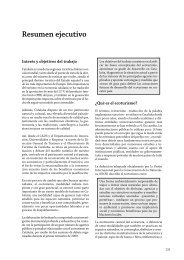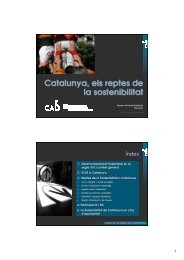Estratègies per al desenvolupament sostenible - Generalitat de ...
Estratègies per al desenvolupament sostenible - Generalitat de ...
Estratègies per al desenvolupament sostenible - Generalitat de ...
You also want an ePaper? Increase the reach of your titles
YUMPU automatically turns print PDFs into web optimized ePapers that Google loves.
5.Participation and Communication5.1. Participation. There is a high <strong>de</strong>gree of consensus on the need for participationof stakehol<strong>de</strong>rs in or<strong>de</strong>r to progress towards sustainable <strong>de</strong>velopment.However, what precisely is meant by the term “participation” is less clearand there are consi<strong>de</strong>rable differences in the way that participation is<strong>per</strong>ceived and un<strong>de</strong>rstood.Sustainable <strong>de</strong>velopment is essenti<strong>al</strong>ly a politic<strong>al</strong> process, and politic<strong>al</strong>structures can tend towards top-down systems of governance. Butsustainable <strong>de</strong>velopment requires the consensus and commitment of societyas a whole; ex<strong>per</strong>ience shows that this cannot be <strong>de</strong>livered by governmentplanning and acting <strong>al</strong>one. So participation processes are nee<strong>de</strong>d to involvethe private sector and civil society, as well as government, in a partnership– processes that will transform governance approaches and facilitate multistakehol<strong>de</strong>rinvolvement in the <strong>de</strong>velopment and implementation of NSSDs.The authorities’ dilemma is that they both need and fear people’s participation.They need the agreement and support of diverse groups of people–<strong>de</strong>velopment is not sustainable otherwise– but they tend to fear thatgreater involvement is less controllable, less predictable, likely to slow down<strong>de</strong>cision-making, and may ch<strong>al</strong>lenge the existing distribution of we<strong>al</strong>th andpower.Governments therefore need to work out how to take a lea<strong>de</strong>rship role in<strong>de</strong>veloping strategies for sustainable <strong>de</strong>velopment – in terms of making thecommitment and setting the agenda, creating an open and participatory“environment” for the processes involved, inviting civil society and othersto participate in <strong>al</strong>l strategy tasks, and providing support where nee<strong>de</strong>d.Care is nee<strong>de</strong>d to avoid participation being seen or promoted as an<strong>al</strong>ternative to established <strong>de</strong>mocratic processes. Rather the approachesand methods available can bolster and support such processes and helpto improve their qu<strong>al</strong>ity and effectiveness.153
















